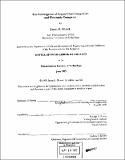The convergence of supply chain integration and electronic commerce
Author(s)
Slibeck, Jason B. (Jason Bennett), 1969-
DownloadFull printable version (2.679Mb)
Other Contributors
Massachusetts Institute of Technology. Dept. of Civil and Environmental Engineering.
Advisor
George A. Kocur.
Terms of use
Metadata
Show full item recordAbstract
Three forces drive the information economy: competition, customers, and change. Supply chain integration seeks to achieve optimal performance of the supply chain as a whole by finding the appropriate balance of "focused" excellence and process coordination. Successfully overcoming the corporate silos of the industrial age requires a focus on process, systems integration, and supply chain collaboration. New models of electronic commerce were often not economically feasible before the widespread deployment of the internet, but they fundamentally rely on the same principles of marketing and supply chain integration that govern the pre-internet business world. Intelligent agents, real-time personalized marketing, and online catalogs all rely on a solid relational database model. These business models have been successfully measured by analyzing their impact on Return on Assets and cost reduction. Recent implementations of technology such as the Extensible Markup Language (XML) hold much promise. Using XML as a communication standard, and with a strong process focus, the RosettaNet organization and other leading companies arc demonstrating that the key clements of a successful business model in an internet economy are process-oriented supply chain integration and customer-focused electronic commerce.
Description
Thesis (M.Eng.)--Massachusetts Institute of Technology, Dept. of Civil and Environmental Engineering, 1999. Includes bibliographical references.
Date issued
1999Department
Massachusetts Institute of Technology. Department of Civil and Environmental EngineeringPublisher
Massachusetts Institute of Technology
Keywords
Civil and Environmental Engineering.